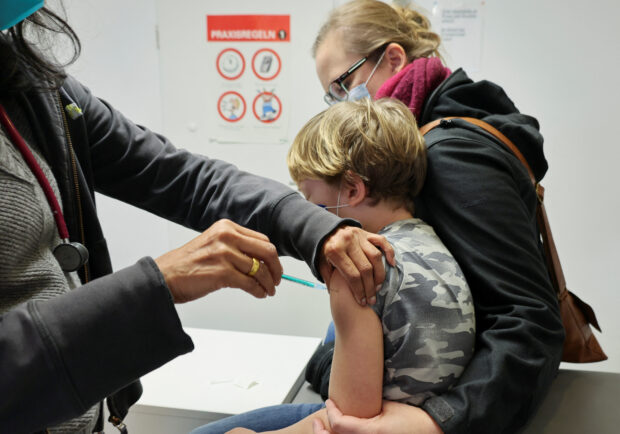EU announces deal with Pfizer, others to reserve vaccines for future pandemic

Seven-year-old Max gets a dose of the Pfizer-BioNTech children vaccine against the coronavirus disease (COVID-19) at a children doctor’s practice in Bonn, Germany, December 15, 2021. (REUTERS / File Photo)
LONDON – The European Commission has contracted Pfizer and several European companies to reserve capacity to make up to 325 million vaccines per year in case of a future global health emergency, it said on Friday.
The agreement, first reported by Reuters earlier in the day, covers mRNA, vector-based and protein-based vaccines and does not relate to existing COVID-19 vaccine agreements between the EU and vaccine makers including Pfizer.
The European Commission said in a statement announcing the deal that the COVID pandemic showed that Europe needs to be better prepared for future health emergencies.
The deal ensures that companies are ready “to respond to a crisis” by keeping their facilities up to date and monitoring their supply chains, “including stockpiling where necessary”, the Commission said. If a new public health emergency is declared, companies would “rapidly start production”, it said.
But vaccine equity activists said the EU risked a repeat of what the World Health Organization dubbed “vaccine apartheid” during COVID-19.
Article continues after this advertisement“After a pandemic in which developing countries were sent to the back of the queue for vaccines and treatments, the EU and pharmaceutical companies seem to be planning to do it all over again in the next health crisis,” said Mohga Kamal-Yanni, policy co-lead for the People’s Vaccine Alliance.
Article continues after this advertisementThe Commission has selected Pfizer’s plants in Ireland and Belgium to reserve capacity to produce mRNA vaccines. It selected Spanish companies Reig Jofre and Laboratorios Hipra SA to reserve capacity for protein-based vaccines and Bilthoven Biologicals B.V. of the Netherlands for vector-based vaccines. None of the companies immediately responded to a request for comment.
The World Health Organization has urged governments and manufacturers to reserve up to 20% of any tests, vaccines or treatments for the global agency to distribute in poorer countries to avoid a repeat of the “catastrophic failure” during the COVID pandemic, according to a draft of a global pandemic agreement currently being discussed.